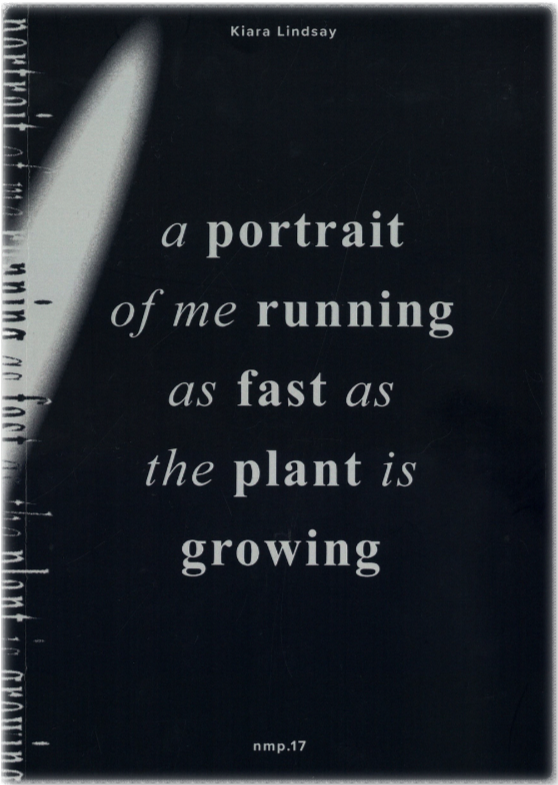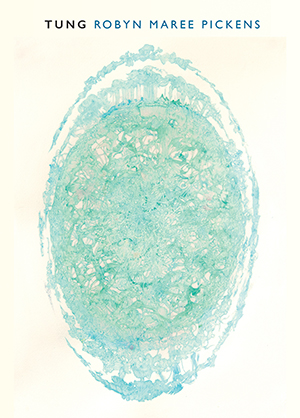
 A Portrait of Me Running as Fast as the Plant is Growing by Kiara Lindsay
A Portrait of Me Running as Fast as the Plant is Growing by Kiara Lindsay
No More Poetry, 2023
Tung by Robyn Maree Pickens
Otago University Press, 2023
Robyn Maree Pickens’ debut collection Tung (Otago University Press, 2023) joins a growing school of contemporary ecopoetics within Aotearoa New Zealand. Recently awarded third place for the international Laurel Prize for “the best collection of nature or environmental poetry,” Tung is deeply concerned with the non-human world and new, or perhaps very old, ways of being. Her poems demand close attention, not interested in following the easy or expected logic but in exploring different forms of language and feeling. Pickens plays with established boundaries and the idea of thresholds between places and beings and languages.
In ‘Tender (excerpt),’ a series of text manipulations to swap out all words beginning with any of the letters in the word ‘tender’ with the word itself result in sentences like, “Tender policies tender shield tender poor and vulnerable can tender tender-offs for a range of STGs,” and “Integration of mitigation with adaptation and sustainable tender compatible with 1.5°C warming tender a systems perspective” (15). This substitution renders a text thick with bureaucratic jargon impenetrable in a different way, revealing how useless phrases like ‘intregration of mitigation’ are in real life, and to the people most affected by these decisions.
Text manipulation and language play are regular features in Tung. In the first of a series of poems inspired by Cecilia Vicuña’s documentary ‘Kon Kon,’ Pickens omits the ‘fi’ and ‘th’ sounds from most of the words. The poem, which is otherwise fairly straightforward in narrating the plot of the film, becomes a puzzle to solve by filling in the missing letters: “the / sh themselves have disappeared. / e artisan shermen have been displaced by major / shing operations” (‘fi / fi / fi / fi / fi / th / fi / fi / th / fi,’ 44). She plays with this convention through a number of the following poems, creating situations where the reader has to bring what they know from the previous poems to a piece to understand it fully, filling in the gaps and at times being able to take a step further and see multiple meanings spilling out of them. In ‘illing my red mouth,’ despite the fact the previous poem has provided us with the ligatures to fill in the gaps, we may read “o er rst” as any combination of ‘offer,’ ‘other,’ or ‘over,’ and ‘first’ or ‘thirst,’ because the poems have trained our brains to run through these various options and find meaning (54). In this way, all possible readings are present simultaneously, the poem so much broader and more fluid than just one interpretation. These are brilliant examples of how the power of a piece of writing is in the moment it intersects with the reader. They’re poems that trust your ability to do the work and bring to them as much as you are able.
Pickens draws from Robin Wall Kimmerer’s idea of using ki/kin pronouns for non-human beings, proposed in a 2015 essay for YES! magazine. In two full page concrete poems, she uses only the aquarius symbol of double zig zag lines (♒︎), traditionally representing water (‘ki,’ 60; ‘ki,’ 61). The symbol appears hundreds of times across the page, forming a vast ocean of choppy waves, to create the shape of the word “ki.” This singular pronoun appears again in ‘Things fish say II,’ with the line “When I say hello to my neighbour ki is scaly,” placing the speaker within the community of non-human beings (65). But this dismissal of boundaries between human and non-human is done with an awareness of the dangers of romanticising the so-called ‘natural’ world and ourselves among it. Subsequent lines read “There is a battery leaking oil from the depot” and “Oil flows like honey inside oh eyelashes.” No part of this world is untouched by humans. As Emma Marris writes in Wild Souls (2021), all life on Earth is affected by human actions: “Today, even the wildest of wild animals are not only influenced by all those millennia of human-caused changes, […] their daily choices involve navigating a world that has been rearranged for human needs and desires” (60).
On page 76, as if denoting a new section but listed as a piece in its own right in the contents, the Finnish word ‘jää’ appears, followed by a vertical bar and the word ‘threshold.’ Convention suggests the latter is a translation of the Finnish, but a quick search reveals that ‘jää’ actually means ‘ice’. What are we to make of this small pause that seems to name itself as a break between two defined spaces, that crosses between languages? Ice, in a way, is a kind of threshold between liquid and solid, especially in the world we and Tung inhabit, where 1.5 degrees of warming is a globally accepted threshold (there it is again) under The Paris Agreement – a benchmark it seems increasingly likely we’ll far surpass if we don’t divert drastically and immediately from our current path.
Despite how readily Tung looks down the barrel of the climate change gun and tells us what it sees, this is not a book of despair. Soft touches of love come through on every page. Pickens shows us that grief and hopelessness are not the same thing. ‘Blessings on Joanna’ overflows with joy and hope (68). Written for painter Joanna Margaret Paul, the poem is a list of blessings with no breaks but separated by double slashes, so they pile up on each other and spill outwards. We begin with a line from the poem ‘Untitled’ by Paul, who Pickens describes as a “maker of space,” and quickly expand out to:
// the looking into a tree // the shape of it and the edges // the shape it leaves behind and the illuminati edges // the such stripe // a poetics for shifting // a nerve can // brushing and love // blessings on the window frame who makes a space with edges // blessings for the looking through and the viewing (68)
The poem is so rich and full that it creates a strong sense of Joanna Margaret Paul’s paintings, even if you’ve never heard of her or have any idea of her work.
Peppered through Tung are references to queer love. Pickens casually mentions girlfriends and flatmates with top surgery scars in a way that feels comforting, a sense of belonging where I wasn’t necessarily looking for it. But it makes sense that this way of thinking about different beings and different ways to be comes from a queer space, a space where conventional boundaries and paths are already partially dissolved.
Tung is clear about the works that influenced it, giving nods to its artistic and literary forebears, but it also feels like it’s taken a big step sideways. It challenges the reader to think deeply and follow a logic that strays from the normalised path. Many of the poems will entice you back, knowing that you can’t see everything on a first read. The power in this is how those interactions develop and change over the course of reading. Tung is a richly layered collection with poems that are deep in conversation with each other and with other texts. I hope we get to read more work that inhabits this space, especially from Pickens.









